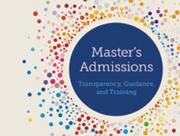You are on CGS' Legacy Site.
Thank you for visiting CGS! You are currently using CGS' legacy site, which is no longer supported. For up-to-date information, including publications purchasing and meeting information, please visit cgsnet.org.

CGS Contact: Katherine Hazelrigg ETS Contact: Jason Baran
(202) 461-3888 / khazelrigg@cgs.nche.edu (609) 683-2428 / jbaran@ets.org
In Master’s Degree Programs, Admissions Processes Prioritize Retention
CGS Study Highlights Goals and Limitations of Current Master’s Admissions Processes
Washington, DC — Today the Council of Graduate Schools (CGS) released findings from a year-long study designed to better understand the processes and criteria used to evaluate applicants to master’s degree programs. Supported in part by Educational Testing Service (ETS), the project sheds new light on the way master’s programs select their future students.
Among the project’s key findings is that both master’s program faculty and graduate deans consider the ability to successfully complete coursework to be an important criterion for evaluating candidates for admission. In a survey conducted by CGS, 79% of research-focused master’s program directors and 84% of professionally-focused master’s program directors identified the potential to complete coursework as a very important consideration during the admissions process. This finding suggests that universities place higher value on the likelihood of a student’s retention relative to their potential to contribute to the program environment and other factors.
The findings also shed light on the various weight given to common elements in a student’s application package. According to the survey, letters of recommendation are used to evaluate a wide range of cognitive and non-cognitive attributes. For example, letters of recommendation were used by 90 to 92% of the graduate program directors as evidence of an applicant’s non-cognitive qualities, such as persistence, dependability, and collegiality/collaboration/cooperation. Because letters of recommendation can introduce biases into the admissions process, however, this finding suggests that it is very important for programs to develop consistent ways of evaluating a letter’s contribution to the admissions package.
“There is quite a bit of agreement about the evaluation criteria and processes used in master’s admissions, and the apparent focus given to student retention is good news,” said CGS President Suzanne Ortega. “However, this study also uncovered opportunities to help master’s admissions committees and deans achieve their admissions goals more effectively. We need better resources, such as rubrics, to help universities consider candidates consistently and with attention to the full range of attributes they are seeking for their programs.”
David Payne, ETS vice president of global education, said, “The programs and deans surveyed consistently identified critical thinking as a key attribute they consider when evaluating an applicant’s potential to achieve desired outcomes, such as degree completion and post-graduate success. The GRE® General Test measures aspects of critical thinking in each of the test’s three sections, and it continues to provide value as a common, objective measure to compare applicants with various backgrounds and educational experiences. The report recommends that those involved in the admissions process receive more training around evaluating submitted materials, including score interpretation and avoiding bias. This may include how reviewers should weight GRE scores — as part of a holistic admissions process that places appropriate value on all submitted materials — to achieve their program’s enrollment goals.”
The study’s authors outline five recommendations aimed at master’s education leaders interested in improving the master’s admissions process. The recommendations include providing greater transparency in master’s admissions procedures, providing information and support to help admissions committees avoid biases, offering training to increase faculty and staff involvement in the process, and developing tools to evaluate non-cognitive attributes. The report also calls for additional research to clarify best practices in this area.
More information about the report, including data tables from the surveys, can be found on the CGS website.
About the report
Master’s Admissions: Transparency, Guidance, and Training is the final report of the CGS/ETS Master’s Admissions Attributes project, which was conducted in three stages: regional focus groups to develop survey tools; two surveys, one for graduate school staff and for master’s program directors; and a colloquium to discuss the results from the two surveys and their implications. Three research questions were developed to guide the conversation: 1) What is success in a master’s program? 2) What attributes are currently used in admissions decisions to predict success? 3) What evidence is currently used to evaluate the attributes? The report outlines and summarizes the project findings.
###
About CGS
The Council of Graduate Schools (CGS) is an organization of approximately 500 institutions of higher education in the United States and Canada engaged in graduate education, research, and the preparation of candidates for advanced degrees. The organization’s mission is to improve and advance graduate education, which it accomplishes through advocacy in the federal policy arena, research, and the development and dissemination of best practices.
About ETS
At ETS, we advance quality and equity in education for people worldwide by creating assessments based on rigorous research. ETS serves individuals, educational institutions and government agencies by providing customized solutions for teacher certification, English language learning, and elementary, secondary and post-secondary education, as well as conducting education research, analysis and policy studies. Founded as a nonprofit in 1947, ETS develops, administers and scores more than 50 million tests annually — including the TOEFL® and TOEIC® tests, the GRE® tests and The Praxis Series™ assessments — in more than 180 countries, at over 9,000 locations worldwide. WWW.ETS.ORG




